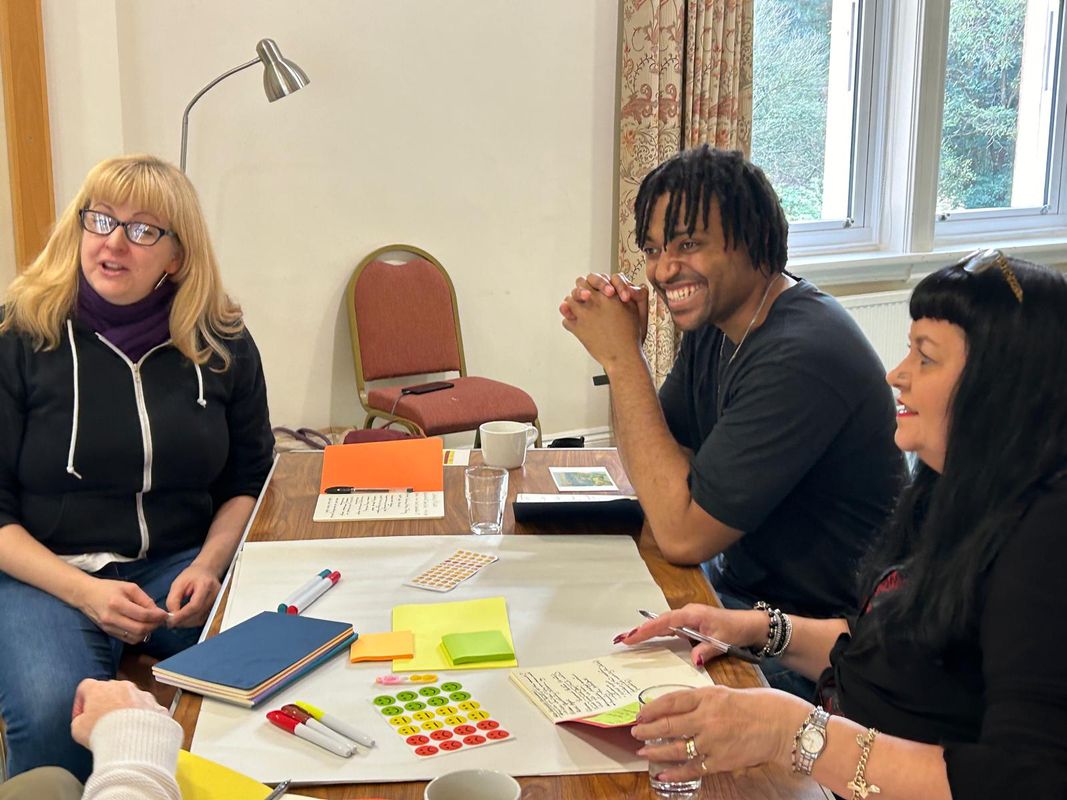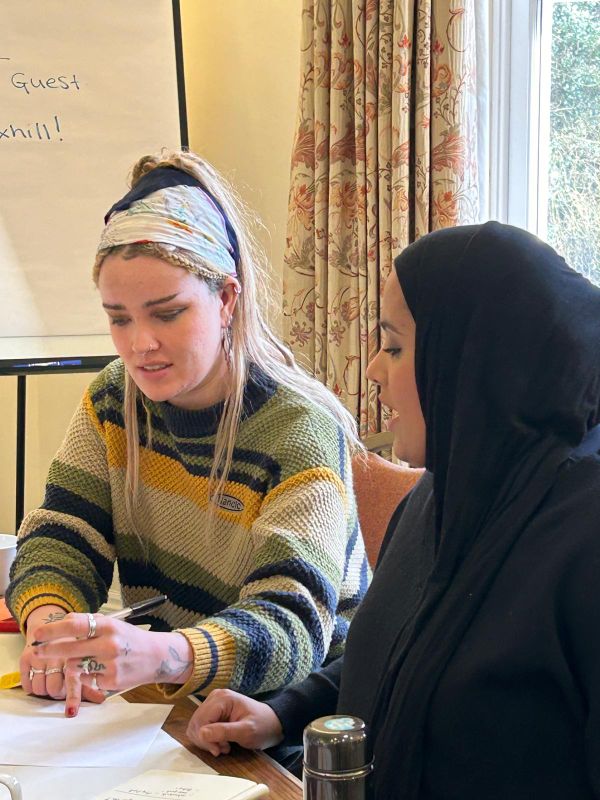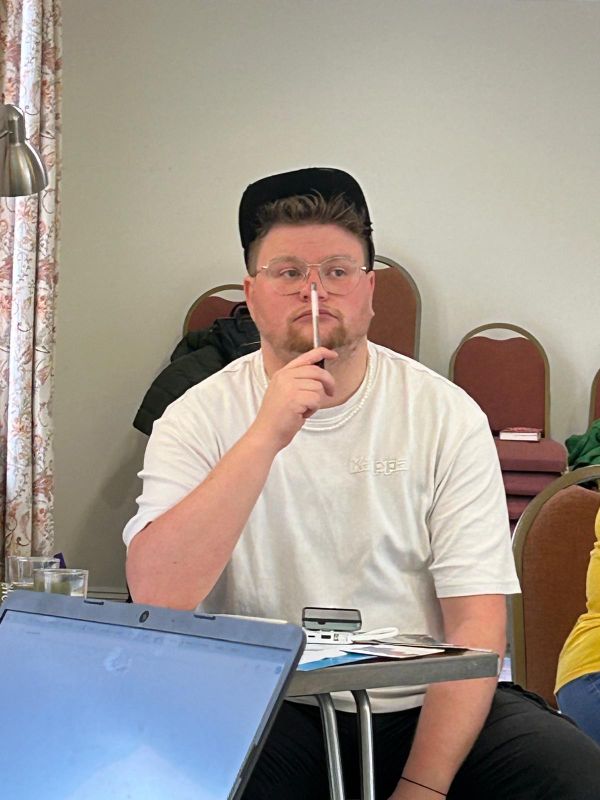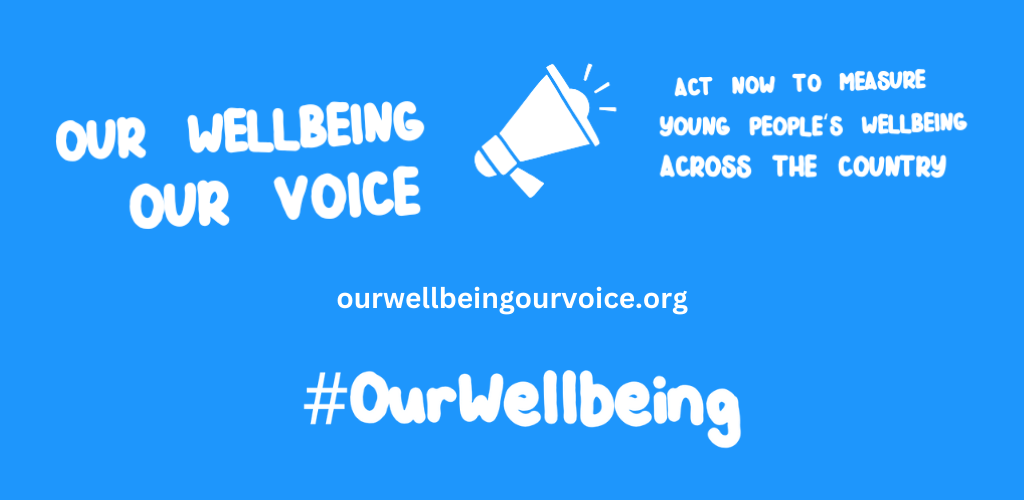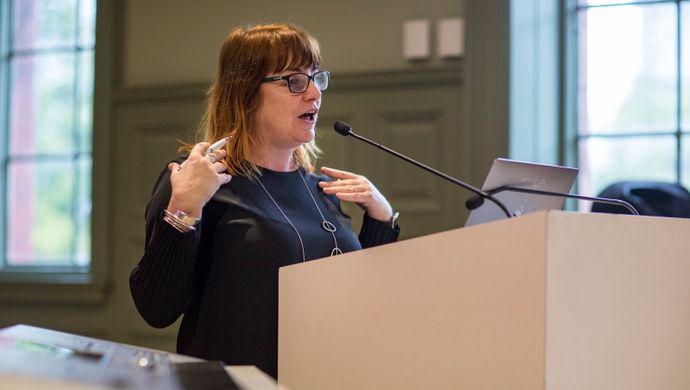Harnessing the Power of Poetry
An update on our Rhyme and Reason pilot
Friday 7 February 2025
Our Rhyme & Reason pilot is only part way through its 10-week delivery timeline, but it's already clear that the project is very special.
The project has been funded by Steph Lampl Foundation and collaborates with Edge Hill and Salford Universities to build on the success of their Arts for the Blues model.
Steph's family established the Steph Lampl Foundation following her tragic death at the age of 21. She was a very bright, energetic and compelling young woman who loved poetry. The Foundation focuses on reaching young people who would not otherwise have the opportunity to experience poetry.

I feel privileged to be on the cusp of this journey!
Participant
The power of poetry
The Rhyme & Reason pilot project aims to explore how poetry can be used as a tool for well-being. It brings together teachers from five North West schools with five poets; providing them with the knowledge and space to co-create and lead class-based creative activity, using Arts for the Blues as a framework.
Arts for the Blues was developed to address depression, low mood and anxiety through arts-based interventions. The therapeutic model was initially used for adults and in clinical settings. It has been modified specifically for this pilot to see if it can support delivery in non-clinical settings by teachers and teaching artists (in this case, poets).
The pilot is being delivered to 2 whole classes in each participating school over a period of 10 weeks, engaging pupils in both Key Stage 3 and Key Stage 4.
The state of children's mental health in the UK
The importance and urgency of initiatives like Rhyme & Reason becomes all the more pronounced when we consider the statistics on children's mental health in the UK.
-
1 in 5 children and young people aged 8-25 in 2023 had a mental health difficulty.
-
Almost 1 million children had active referrals for mental health services in England in 2022-23.
-
Children wait a long time to access support with 40,000 experiencing waits of 2 years or more.
Sources: (1) Children and Young People's Mental Health Coalition, (2) and (3) The Children's Commissioner.
These alarming statistics highlight the urgent need for effective mental health support for young people. The current system is overwhelmed and can often only be accessed when the problem has reached crisis point.
Thinking about the quote by Desmond Tutu:
“There comes a point where we need to stop just pulling people out of the river. We need to go upstream and find out why they are falling in.”
The reason children and young people are falling into this river seems increasingly obvious.
The purpose of Rhyme & Reason
According to research from the Joseph Rowntree Foundation:
"despite living in one of the richest countries in the world, around 3 in 10 children (4.3 million children across the UK) live in poverty. This not only inflicts hardship on children in their formative years but also has a long-term impact on their future health, wellbeing, and economic prospects. In 2023, around 1 million children experienced destitution, the most severe form of hardship."
Analysis from the Children's Commissioner for England also points out that:
"this generation of children has experienced uniquely uncertain and challenging times. Some have spent their most formative years isolated and indoors, fearful they or their loved ones may catch a deadly virus. They have felt the squeeze of a cost-of-living crisis and are keenly aware of the pressure their parents are under. They are constantly bombarded by negative news, of wars and climate catastrophe. An increasing number are exposed to the harmful impact of social media, cyber bullying, and online exploitation."
Continuing with the river analogy... if the river represents our undeniable Mental Health Crisis, wouldn't it be great if we could stop our children and young people from falling in altogether?
Through Rhyme & Reason, we are hopeful that the creative activities and experiences being facilitated by the teachers and poets can have a preventative and/or a therapeutic effect; meeting the young people where they are. For some, the activities may be mindful and creative learning opportunities that give these young people the space to make sense of the world. For others, the programme can offer some tools to explore their emotions, anxiety and negative thoughts.
All the schools involved in the project have clear referral routes for young people, should specialist support be needed. We have also established group supervision sessions for the adult participants, delivered by Edge Hill University, to support their wellbeing and help them deal with any challenges that arise.
The passion of all involved was palpable, everyone keen to make a difference for young people.
Residential participant
Why poetry?
Poetry has a unique ability to resonate with individuals on a deep emotional level.
By exploring existing poems and creating their own, students can find new ways to articulate their thoughts and emotions. This process not only enhances their creative skills but also promotes positive mental health by providing a safe space for self-expression.
Our project participants
The Rhyme & Reason pilot is being delivered in five secondary schools across Merseyside, Cheshire and Wigan Borough. We are also working with five early-to-mid-career poets (who will plan and deliver activities alongside the lead teacher in their paired school) plus a Poet Mentor.
They are:
|
Schools |
Poets |
The story so far
To ensure that the teachers and poets felt equipped to deliver this programme, they all attended specialised training together. This included bespoke training in Trauma Informed Practice delivered by Collective Encounters, and a modified version of the Arts for the Blues delivered at Edge Hill University.
The training was followed by a two-day overnight residential, at which the participants reflected on the training, experimented with creative activities, explored creative evaluation and, crucially, the teacher and poet pairs had time to co-create their lessons.
We were joined on the residential by Professor Scott Thurston, who is a co-creator of Arts for the Blues and Professor of Poetry, Innovation and Creative Practice at Salford University. He kindly delivered a session on poetry and is acting as a critical friend to the pilot.
This programme of CPD - the residential especially - felt transformational for everyone who took part.
As we move into the 10-week school delivery phase of this project, we will soon begin to see the impact the poetry activities have on participating young people. That said, the feedback we've already received from the teachers and poets suggests this project is something very special.
I liked that the training offered opportunities for individual learning, as well as how the process could be applied in classroom settings.
Residential participant
What's next?
We look forward to sharing more learning from this initiative later this year as we begin to identify the wider impacts of the work. In the longer term, we're actively looking into opportunities to share this model with a wider audience.
Watch this space for updates!
Join us in supporting the 'Our Wellbeing, Our Voice' campaign
Curious Minds is part of a broad coalition of organisations calling on the government to implement a national wellbeing measurement programme to address the needs of children and young people across England. We invite you to join us!
The wellbeing of children and young people in the UK is at an all-time low. Latest PISA data reveals that 1 in 4 children report low wellbeing, making the UK the lowest-ranked country in Europe. Measuring children’s wellbeing will not only provide the insights needed to drive change but will also demonstrate a commitment to improving the lives of the next generation.

